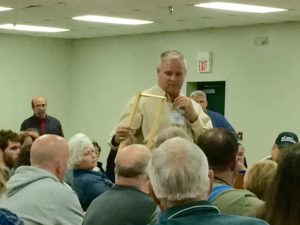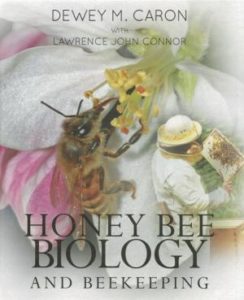Looking for a Beekeeping Class for 2018?
The Northeastern Kansas Beekeepers Association (NEKBA) Bee Class (both part I & part II combined) is nearly 10 hours of education for new and those looking for a re-fresher in their early years of beginning beekeeping. Several courses will be presented by our keynote speaker, Dr. Dewey Caron, on the 2nd day or part II of the class. Included with each registration are presenter’s notes. Additional tag-along members or friends are welcome to attend for a nominal registration fee that also includes the presentation notebook. We are a non-profit organization. The fees cover the costs of rent, books and materials, as well as shared costs for our guest speaker.

This event is for beginning & 2nd or even 3rd year
beekeepers or those looking for a re-fresher. We like to say that you’ll learn more the 2nd time around. The class is held on 2 weekends as there is much to offer. Trying to hit on all topics in 1 day is a lot to try to absorb. We want beekeepers to get the most and learn the best way possible.
Special keynote instructor for March 11, 2018 -Dr. Dewey Caron! Caron will also be in that weekend to lecture at our Kansas Honey Producers Association meeting to be held in McPherson, Kansas on March 9th and 10th.
It’s NEKBA’s annual Beginning Beekeeping Class for 2018. See our NEKBA 2018 Bee Class form, which covers both Sunday’s, March 4th & 11th from 12-5:30 PM.
LOCATION – Douglas County Fairgrounds – 2110 Harper Street, Lawrence, KS. Drive KS K-10 to Harper Street, go north 2 blocks to the Fairgrounds.
Visit the NEKBA.org website for more information and links. Classes are on Sunday’s, March 4 & 11, 2018 (parts I and II).
Registration @ 12PM to pick up your book and name tag(s). Class begins at 12:45PM and we’ll wind down @ 5:00PM
The 2nd day of the workshop is being taught with a special presentation on bee biology, mites, an over-view of hobby beekeeping, and how to’s of starting your own hive. This event offers the opportunity to hear and learn from a distinguished expert in the field of modern scientific beekeeping, Dr. Dewey Caron.
What might it take to get started? Check out this suggested equipment list with pricing from 2017. 
The registration fee includes Dewey’s text book. All registrants will be eligible to win door prizes. You must be present to win.
Each family registration will receive 1) Honey Bee Biology and Beekeeping, Revised Edition Authors or Editors: Dewey M. Caron with Lawrence John Connor and registration notes. Each registered person will receive a set of presentation notes. If you already have these books, there will be an alternate choice available at the door.
More about our guest speaker:
Caron began working with commercial beekeepers as soon as he arrived at Cornell in 1966. Caron also had the opportunity to teach the popular beekeeping class, which Morse had designed from an English course.
He met his wife, Nieves, at The Kellogg’s International Fellows Training Workshop, where she was a fellow from Bolivia and he from Delaware. They now spend part of each year in South America and part near Portland, Oregon, where he has retired with a couple of beehives near the families of his sons.
Caron was well loved as a teacher during his 27 years at the University of Delaware. He taught entomology, ecology and apiculture, carrying a full course load every semester while crisscrossing the state as advisor to the Delaware Beekepers’ Association and giving classes in his extension role. When he retired in 1988, he received the University’s Excellence in Teaching award as well as recognition by the Entomological Society of America for his prowess as an educator.
“I thought after 40 years of beekeeping that I understood something, but things happen repeatedly that have thrown that out the window. I think after a few more years I will get it down.”
Teaching outlines and syllabi from scores of classes became his classic book, Honey Bee Biology and Beekeeping (Wicwak Press). He says, “Beekeeping is applied bee biology.” The book explains aspects of bee biology that determine when and how to manage a colony, a concept inspired by the teaching of Roger Morse at Cornell. The thorough book, first written in 1999, is now in its sixth printing. A new edition will no doubt include information learned since then from DNA: that the bee originated in Africa, not Asia, and Caucasian bees, which were once “readily available” have mostly submerged into the gene pool. These are small points in what is a valuable compendium of valuable information.
Caron has written five beekeeping books, numerous book chapters, over seventy scientific publications and over 300 popular articles on bees and insects. He has been the editor of newsletters for the Delaware Beekeepers Association and the regional organization MAAREC as well as BeeCraft America.
His book Africanized Bees in the Americas (A.I.Root, 2001) came out of his work with AHB beginning with the first invasion in Central America to his involvement in South America – which continues to the present. “African bees have a lot of good solutions. One of them is around Varroa mites. It’s a group of bees that does not do robbing. If there is robbing on their colony, they pick up and leave. Whether it is robbing by ants, a high mite number or robbing bees.”
Hope to see you at the NEKBA Bee Class 2018 !

